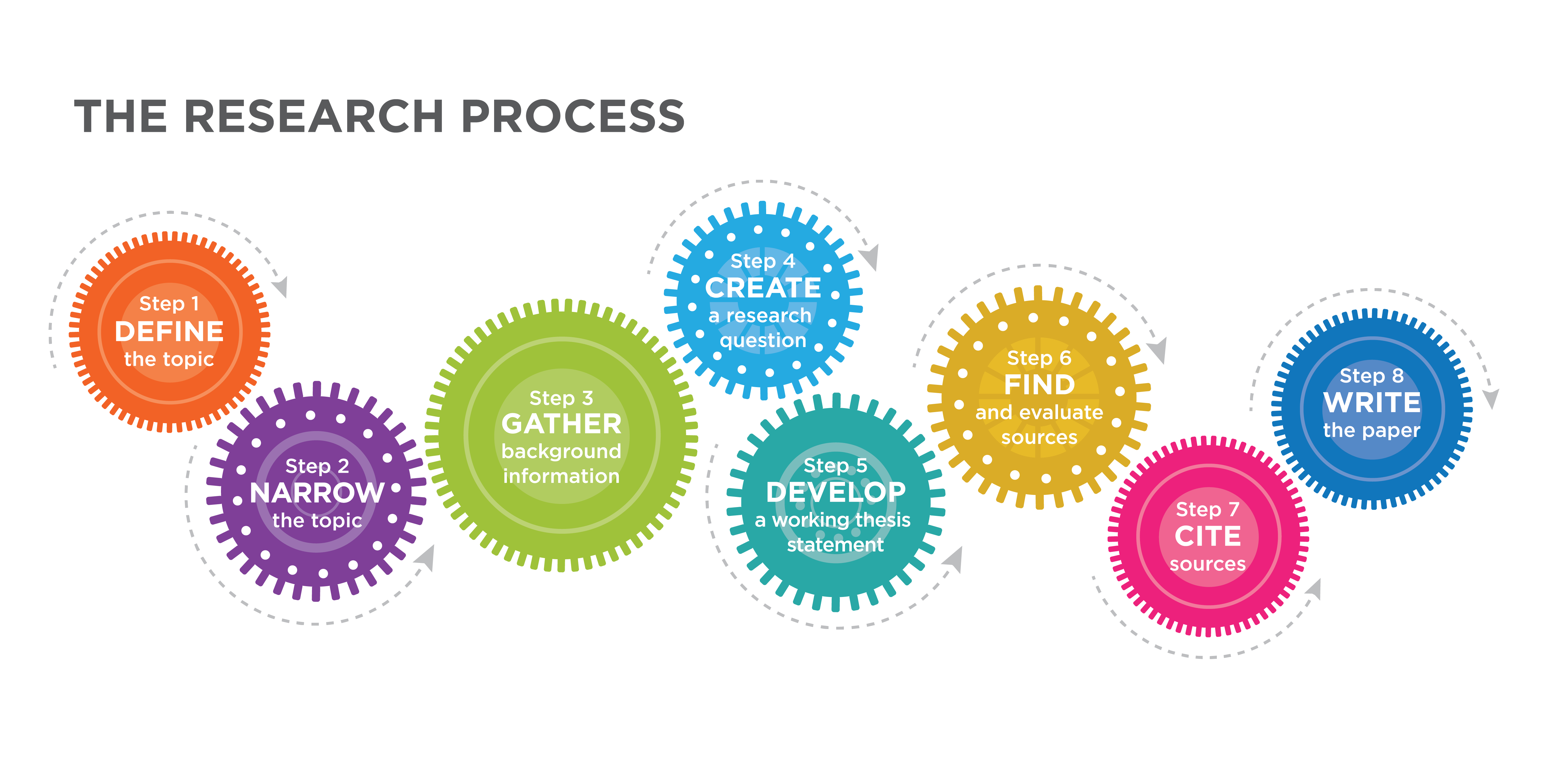16.4: The Research Process
- Page ID
- 5660
The Research Process

Figure \(\PageIndex{1}\)
A good research process should go through these steps:
- Decide on the topic, or carefully consider the topic that has been assigned.
- Narrow the topic in order to narrow search parameters.
- If you are studying the Battle of Gettysburg, for example, you might decide to look into any number of topics related to the battle: medical practices on the field, social differences between soldiers, or military maneuvers. If your topic is medical practices in battle, a search for “Battle of Gettysburg” would return far too many general results. You would also not want to search for a single instance of surgery, because you might not be able to find enough information on it. Find a happy medium between very broad and too specific.
- Do background research, or pre-research, using broad search tools like Google search, Wikipedia, textbooks, or encyclopedias.
- You can also talk about your research with friends, co-workers, and family for more ideas.
- Create a question that your research will address and generate sub-questions from your main question.
- By determining your research question, you can develop a working thesis statement, or the main point you hope to make in your paper. Plan to revise your thesis statement several times as you learn more about your topic. It will help you concentrate on what you want and ignore information that is irrelevant.
- Determine what kind of sources are best for your argument.
- How many sources will you need? How long should your paper be? Will you need primary or secondary sources? Where will you find the best information?
- Create a bibliography as you gather and reference sources. Make sure you are using credible and relevant sources.
- Write and edit your paper! Incorporate the research into your own writing and properly cite your sources.

Figure \(\PageIndex{2}\)
For example, in step one, you might decide that your topic will be the Flint Water Crisis that began in 2014. Then in step two you may considering narrowing it down to either how the lead poisoning got into the water in the first place, government corruption, the impact of the crisis, or environmental racism. You might decide on government corruption and decide to investigate the specific state and local officials involved in the events leading up to the crisis.
After some initial research, you would come up with a research question. A good research question for this example might be, “How did the behavior and actions of state and local officials lead to the Flint Water Crisis?” Next, you generate sub-questions from your main question. For instance, “Who were the public officials during the Flint Water Crisis?” “How did officials react when they first learned of the polluted water?” “In what ways did public officials ignore/exacerbate the water problem?” These questions enable you to create a working thesis statement that can help organize and shape your paper. A working thesis statement for this paper might be “The actions and corruption of state and local officials in Flint led to the Flint Water Crisis.” As you get further into the research, you might modify your thesis statement to be more specific about the types of action and corruption, or what officials were most responsible.
Next, you’ll decide on what type of sources you want to use. Because this is a current event, you may choose a good mix of both primary and secondary sources, as well as popular news articles and scholarly reports on government actions. As you accumulate sources, make sure you create a bibliography, or a list of sources that you’ve used in your research and writing process. It’s always a good idea to keep track of your sources and take notes on where you find information so you can easily include the information you need into your final paper. And finally, have fun doing the research!
Exercise \(\PageIndex{1}\)
- Which of the following is the better research question?
- Is global warming harmful?
- What are the adverse effects of global warming?
- Which of the following is the better research question?
- Do doctors charge too much?
- What factors influence the operating costs of physicians?
- Decide whether or not the following working thesis statements are good or bad:
- Man has had a major impact on the environment.
- Marijuana use in Mishawaka, Indiana has been a problem for law enforcement since the 1970s.
- Miley Cyrus is a horrible singer.
- Profilers have played a necessary role in catching serial killers.
- Answer
-
- b. “Is global warming harmful?” is not the best way to state the question because it’s too general. “What are the adverse effects of global warming?” allows you to discover specific adverse effects.
- b. “Do doctors charge too much?” is not the best way to state the question because it’s too general. “What factors influence the operating costs of physicians?” is the best way to state the question because it focuses on a specific aspect of the cost of medical care.
- a. Bad. This statement is way too vague and broad. What constitutes “major impact”? What aspects of the environment are we talking about? What century are we talking about?
b. Bad. Even if it is true, it is too local and narrow to be supported with national or scholarly research. Sources would probably be limited to local newspaper articles and personal interviews. Can you make those sources “stretch” across a 10 page research paper? Not likely.
c. Bad, because the statement is largely an unfocused opinion. What exactly is “horrible”? How does Miley Cyrus fall into that category? Do you think there are many books or research articles that could support this topic? Probably not.
d. Good. Using this statement for a paper allows you to skip over the sources that do not deal with profiling, that do not deal with the apprehension of serial killers, and that deal only with the injustices of “racial profiling.” A good working thesis statement saves you time and keeps you focused.

